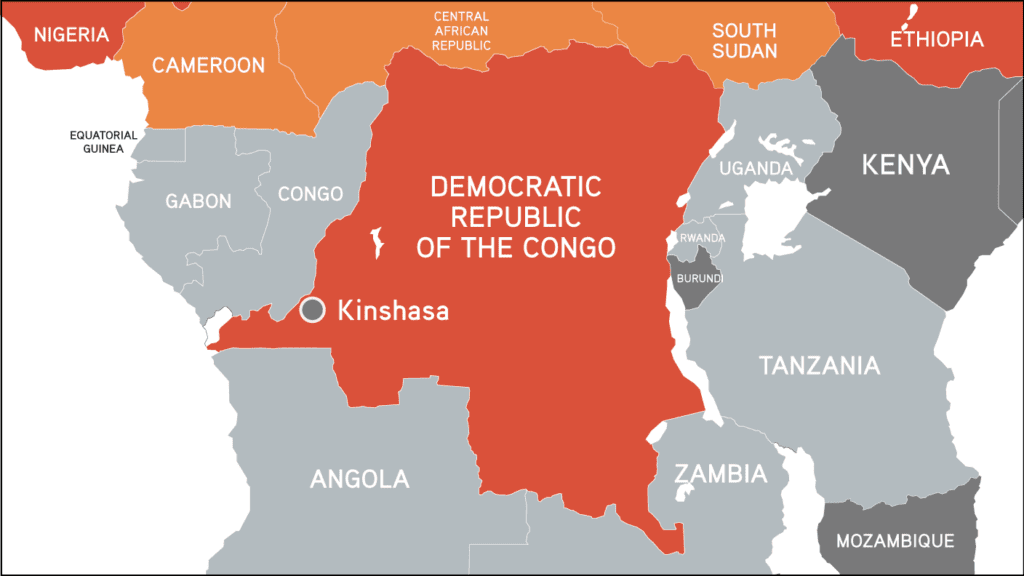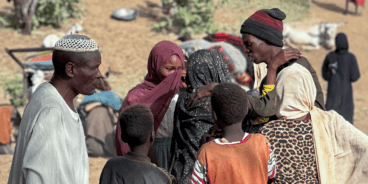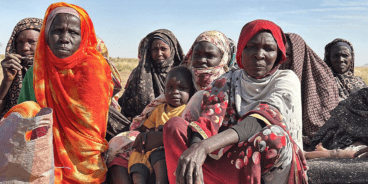Democratic Republic of the Congo

Various armed groups in the Democratic Republic of the Congo recurrently and indiscriminately attack civilian populations, committing violations that may amount to war crimes and crimes against humanity.
BACKGROUND:
Attacks by armed groups and recurring inter-communal violence have threatened populations in the eastern provinces of the Democratic Republic of the Congo (DRC) for more than 30 years. More than 120 militias and armed groups actively operate in Ituri, North Kivu, South Kivu and Tanganyika provinces, many of whom regularly perpetrate widespread violations and abuses against civilians that may amount to crimes against humanity and war crimes. The UN Security Council (UNSC)-mandated Panel of Experts (PoE) has documented some armed groups allegedly executing, torturing and arbitrarily detaining civilians perceived as collaborators of enemy groups. While combating armed groups, the government’s armed forces (FARDC) and police have also been implicated in violations of International Human Rights Law (IHRL) and International Humanitarian Law (IHL), including sexual violence, torture and arbitrary killings, some of which may amount to crimes against humanity and war crimes.
Despite offensives conducted by the FARDC, supported by the UN peacekeeping mission (MONUSCO), violence has escalated in the eastern provinces for several years amidst a surge in attacks by groups like the March 23 Movement (M23), Allied Democratic Forces, Cooperative for the Development of Congo and Democratic Forces for the Liberation of Rwanda, among others. Since 2021, when M23 re-emerged after nearly a decade of dormancy, the group has perpetrated widespread attacks across North Kivu amid intensifying clashes with the FARDC and a coalition of abusive militia known as Wazalendo. The clashes have endangered civilians, with all parties to the conflict perpetrating IHL violations, including indiscriminate shelling, killings, sexual violence and forced displacement. The UNSC-mandated PoE has documented evidence of Rwandan troops providing support to M23, with at least 3,000-4,000 soldiers fighting alongside M23.
Ongoing armed group activity has resulted in a marked increase in conflict-related sexual violence and grave violations against children. Recurrent clashes and ongoing insecurity have resulted in a displacement crisis, with over 7.3 million people internally displaced. Armed groups regularly perpetrate targeted attacks against displacement sites across the eastern provinces, killing hundreds of civilians and causing further displacement.
The International Criminal Court has also been investigating serious crimes in the DRC since 2004. In 2023 the DRC government requested the Court investigate alleged crimes committed in North Kivu since January 2022. In June 2023 the Chief Prosecutor announced a preliminary examination, and, in October 2024, he renewed the investigative efforts and welcomed the DRC’s decision to establish a steering committee for a special criminal court.
In 2023 the Congolese government requested an accelerated withdrawal of MONUSCO by the end of 2024. MONUSCO withdrew from South Kivu in June 2024, following the disengagement plan agreed with the Congolese government. The deterioration of the security situation in North Kivu and Ituri, the two remaining provinces where MONUSCO is operating, prompted the UN and Congolese authorities to reassess the mission’s exit strategy. On 20 December 2024 the UNSC renewed the mandate of MONUSCO for another year.
RECENT DEVELOPMENTS:
At the start of 2025, M23 – reinforced by troops and equipment from the Rwanda Defence Force – intensified its offensive in North and South Kivu, seizing the provincial capitals and consolidating control over the mineral-rich region. According to the DRC government, approximately 7,000 people have been killed in fighting since January. Ongoing clashes have been characterized by serious human rights violations and abuses, including summary executions and conflict-related sexual violence. According to the UN Refugee Agency, over half a million people have been forced to flee and displacement sites have been targeted with heavy artillery, destroying shelters and killing civilians. The UN Office for the Coordination of Humanitarian Affairs has reported looting and indiscriminate attacks on water, sanitation and health facilities. M23 has also impeded the movement of UN personnel.
In response to the deteriorating situation, on 7 February the UN Human Rights Council adopted a resolution urgently establishing a Fact-Finding Mission (FFM) and a subsequent Commission of Inquiry on the serious human rights violations and abuses and violations of IHL committed in North Kivu and South Kivu provinces since January 2022. This was followed by the UNSC adopting a resolution on 21 February, which demands the immediate cessation of further military advances by M23 and reiterates the call for an immediate and unconditional ceasefire.
Throughout February and March international pressure has steadily grown against M23 and Rwanda. This includes sanctions by the United States and a range of measures by the United Kingdom, Canada and Germany that restrict or suspend bilateral financial aid and development cooperation with Rwanda.
ANALYSIS:
For decades, various armed groups have exploited the absence or weakness of state authority in eastern DRC to perpetrate attacks against civilians. Rampant impunity and competition for control of profitable minerals have enabled the proliferation of such groups. Ethnically motivated and deliberate attacks against displaced Congolese have led to waves of secondary displacement while sexual violence continues to be used as a weapon of war.
The rapid advance of M23, a group with a history of perpetrating widespread abuses and war crimes against civilians, along with ongoing attacks by other armed groups, has impeded MONUSCO’s ability to protect civilians and conduct life-saving operations, leaving populations vulnerable. Amid ongoing clashes between the FARDC and Rwanda-backed M23, hate speech and discrimination has surged, heightening grievances and risks of further atrocities. Meanwhile, the FARDC’s collaboration with ethnic militias with abusive records increases risks for civilians.
M23’s resurgence has exacerbated regional tensions, sparking fears of a broader, regional conflict and has contributed to the militarization of mining sites in eastern DRC. A military solution will not resolve the political, social and economic drivers of the conflict, including the illegal exploitation of natural resources and ethnically motivated attacks. All parties to the conflict must engage in existing diplomatic peace efforts, such as the Nairobi and Luanda processes, to stabilize the region.
RISK ASSESSMENT:
-
- Indiscriminate use of heavy artillery, shelling and bombings near civilian areas, as well as threats posed by unexploded ordnance.
- Heightened risk of regional conflict due to escalating tensions and severed diplomatic relations between Kinshasa and Kigali.
- Alarming levels of conflict-related sexual violence, disproportionately impacting displaced women and girls.
- Unprecedented scale of children recruitment and use in hostilities by myriad armed actors.
- Existing security vacuum exacerbated by FARDC deployment to fight M23 and MONUSCO withdrawal from South Kivu, emboldening other armed groups to remobilize and target civilians.
NECESSARY ACTION:
The DRC government and all regional and bilateral forces must prioritize the protection of civilians and compliance with IHL and IHRL while addressing the ongoing threats posed by armed groups. The FARDC should implement a vetting process to identify and provisionally remove individuals who may have been implicated in serious human rights violations, as well as cease the use of abusive militias as proxy forces. The FARDC and police should thoroughly investigate and publicly report on any violations by their forces.
Rwanda should end its military support for M23 and respect the territorial integrity of the DRC. All parties to the conflict must adhere to obligations under international law, and resume dialogue within the framework of the Luanda and Nairobi processes and rigorously pursue a lasting ceasefire.
The international community should suspend military assistance to governments found supporting armed groups and ensure that any support, financial or otherwise, does not fuel human rights violations. Neighboring states should ensure that forces active in the DRC refrain from illicit activities.
The FFM should provide a comprehensive assessment of ongoing atrocity crimes and coordinate with the Team of International Experts on the DRC, the PoE and the Special Envoy of the Secretary-General for the Great Lakes region. The FFM should also take into consideration the findings from the PoE.
Atrocity Alert No. 434: Sudan, Ethiopia and the UN Human Rights Council
Related Content

Atrocity Alert No. 435: Sudan, Israel and the Occupied Palestinian Territory and Democratic Republic of the Congo

Populations at Risk, March 2025
